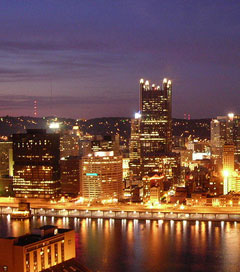The obese American is not just a person; it's also most US cities. Most cities here sprawl over way too much land for their number of inhabitants. Compare that footprint to Old World cities that are much more compact.
While we say “footprint,” the more accurate term would be “tire track.”
Our cities take up so much land not for humans, but for automobiles. Cars like wide streets, parking lots, driveways, parking garages for rest, gas stations for sustenance, repair shops and parts stores for health, dealer lots to show off, junk yards for final repose, plus highway patrol stations, parcels zoned commercial for insurance offices etc. Add it all up, cars take up as much surface area as do people in American cities.
Old World cities grew up in the era of muscle power, when trips were limited by the legs of humans, donkeys and oxen; hence, the old centers of old cities are quite compact. American cities grew up in the era of mechanical power, enabling people to transport themselves over greater distances; hence, the “broad shoulders of Chicago.” We're spoiled by automobiles, but there is a regimen that would shape up both our waistlines and our skylines, one that's worked wherever tried: land dues.
A few modern cities have put themselves on this regime and are somewhat more compact than neighboring towns of similar attributes. The trim towns weren't trying to become firm but rather raise revenue, attract investment and generate jobs. The in-fill was a welcome byproduct.
What these cities did – notably Pittsburgh (twice voted America's Most Livable) – was shift their property tax off buildings, onto land, turning the property tax into land dues. When owners must pay for land on an ongoing basis, they quit withholding prime sites from productive use (whether they were speculating or just forgot they owned the land) and get busy putting up buildings. All the new construction is what requires inputs of labor and capital, and the resultant busier city raises the tax base, so econo-man is happy.
But environmentalists have reason to cheer, too. Owners in-fill cities from the center out. Land dues are heaviest for the pricey sites, which usually are downtown. Those owners are the ones most eager to redevelop their vacant lots and abandoned buildings. So, they absorb the demand for new development, leaving little or none leftover to sprawl onto the fringe, while Mayor of Harrisburg (Pennsylvania's capital) Steve Reed credited their levy on land for sparing the suburban land.
Alan Durning (formerly of WorldWatch) calls land dues “the sprawl tax.” Joseph Dimasi calculated that shifting the property tax landward would shrink Boston's radius a half mile (National Tax Journal, 1987 December). Recall the blessings of density: less heat leakage from contiguous buildings, less fuel consumption from shorter trips, less smog and oily runoff, fewer fatalities, less bowling alone, more bus riding and bike riding. Residents can get in as good shape as their cities, and become more neighborly.
If you've been in the Sierra Club long, you might have heard of the tax on land, since John Muir endorsed it (“The American Conservation Movement” by Stephen Fox). The key element is not the tax, but the idea that we have a right to some earth, to all Earth in good shape and to a share of her value, since none of us made Earth, all of us need Earth and all of us make her valuable; location value rises with population density. The tax is just a way to recover our commonwealth with which we could then fund any desired social programs or pay ourselves a share, à la Alaska's oil dividend, or do a mix of both.
The property tax shift is part of the larger Green Tax Shift (see Durning's book, “Tax Shift”), which is the mate of the Green Subsidy Shift – quit subsidizing sprawl, fossil fuels, logging etc., (see Friends Of the Earth's Green Scissors campaign) and instead disburse government support equitably. These policies, in turn, dovetail nicely with the insights coming out of ecological economics (I abbreviate it to “geonomics”), such as Nobel laureate (2009) Elinor Ostrom's work on the commons.
Such thinking is spreading. Which is good. Because if the public does not recover the socially-generated value of sites and resources, it leaves that immense value – trillions in the US each year (derived from data at the US BEA web site) – to a few speculators and growth promoters to pocket by wasting land and leaving behind waste. People who want to reverse the human assault on the planet have no choice but to come to grips with money made via eco-ploitation.
Fortunately, to shift the paradigm, we can do so in winnable steps, starting locally. While a few Pennsy towns have already shifted their property tax, more could by jazzing up the proposal. Combine it with axing unpopular taxes, and, as carbon tax proponents have, combine it with the dividend, similar to the Aspen, Colorado, housing assistance from a land tax.
Add local revenue reform to your to-do list. Money is where the rubber meets the road. Doing so, you'll make your city – and its residents – fit, svelte and low impact.
Media that fights fascism
Truthout is funded almost entirely by readers — that’s why we can speak truth to power and cut against the mainstream narrative. But independent journalists at Truthout face mounting political repression under Trump.
We rely on your support to survive McCarthyist censorship. Please make a tax-deductible one-time or monthly donation.
